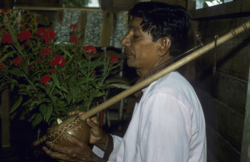Ektara
Ektara (literally "one-string", also called iktar, ', yaktaro gopichand) is a one-string instrument. It is most often used in traditional music from Bangladesh, India , Egypt, and Pakistan.
The ektara was a regular string instrument of wandering bards and minstrels from India. It is plucked with one finger. The ektara usually has a stretched single string. An animal skin is over a head made of dried pumpkin/gourd, wood or coconut. The neck is a pole or split bamboo cane.
Pressing the two halves of the neck together loosens the string. This lowers its pitch. The sound can be changed many ways by slight changes in pressure.
The various sizes of ektara are soprano, tenor, and bass. The bass ektara, sometimes called a dotara often has two strings.
Ektara Media
- Ektara 2.jpg
Ektara (musical instrument with only one string) of Bangladesh.
- Parvati Baul at Ruhaniyat, Purana Qila.JPG
Parvathy Baul at Ruhaniyat mystic music festival, at Purana Qila, Delhi
The tradition of a holy man with a one-stringed veena was preserved in this 16th-18th century C.E. sculpture of Sage Agastya. The instrument has some resemblance to the eka-tantri vina, also one-stringed.
India, 5th century C.E. Ajanta Caves, Cave 17. Image of a one-string drone accompanying religious singing. The musician plucks an alapini vina, a stick-zither style veena resting on his shoulder.
Other websites
![]() Media related to Ektara at Wikimedia Commons
Media related to Ektara at Wikimedia Commons





